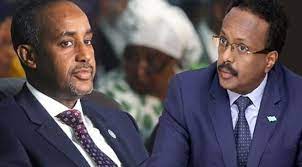The Somali capital Mogadishu remains on edge with a protracted row between the president and his recalcitrant prime minister culminating in troop movements across the city for a second day on Wednesday.
Following a fresh row over the slow pace of Somalia’s electoral process that should culminate in the election of the country’s next leader, President Mohamed Abdullahi Mohamed had announced the sacking of Prime Minister Mohamed Hussein Roble, leading to a showdown between the two bitter rivals.
The pair had clashed in similar circumstances last April when the president unilaterally decided on prolonging his stay in power after his term expired that month.
Farmajo has been president of Somalia since 2017 but his critics, chief among them PM Roble have accused him of deliberately stalling the process leading to electing his possible successor in a bid to usurp power in the horn of Africa nation of just over 15 million people.
Roble has accused the president of staging an unconstitutional coup after announcing the prime minister’s removal.
Farmajo said Roble has been involved in corruption over alleged land-grabbing.
Both Farmajo and Roble blame each other for a lack of genuine commitment to the electoral process which would have witnessed the installation of a new president last April.
Somalia’s presidents are elected indirectly by a lower and upper house of parliament whose members are chosen by some 30,000 delegates from the country’s disparate clans.
While elections for the upper house in all of Somalia’s states have been completed and voting has been underway for the lower house since November, the election of a president still proves elusive.
Meanwhile the high-profile standoff has spilled on to the streets of the capital Mogadishu where witnesses say heavily armed pro-Roble troops have been on patrol on Wednesday in a show of defiance following the president’s decision to suspend and later fire the premier.
The current political crisis is reminiscent of the violence which erupted in Mogadishu in April by rival army factions divided between backing the president and prime minister.
Soldiers loyal to Roble have been deployed around the presidential palace and other key government installations across the capital.
The international community have called for restraint from both sides as clan elders scramble for talks between Farmajo and his estranged prime minister.
The United States said it is monitoring the political situation very closely and warned that those obstructing Somalia’s path to free and fair elections would be punished.
The political crisis triggered by Somalia’s delayed elections detracts from the government’s military campaign against the al-Shabaab insurgency which has been raging since 2010.
Although the insurgents have been beaten back from Mogadishu, they still control large swathes of the Somali countryside and retain the capacity to launch sporadic attacks on the capital and other cities under the federal government.
A hybrid African Union peacekeeping force known as AMISOM has been helping federal troops deal with the insurgents.
Since late Siad Barrie was toppled in the early 1990s, Somalia has struggled to maintain a semblance of stability.
WN/as/APA


